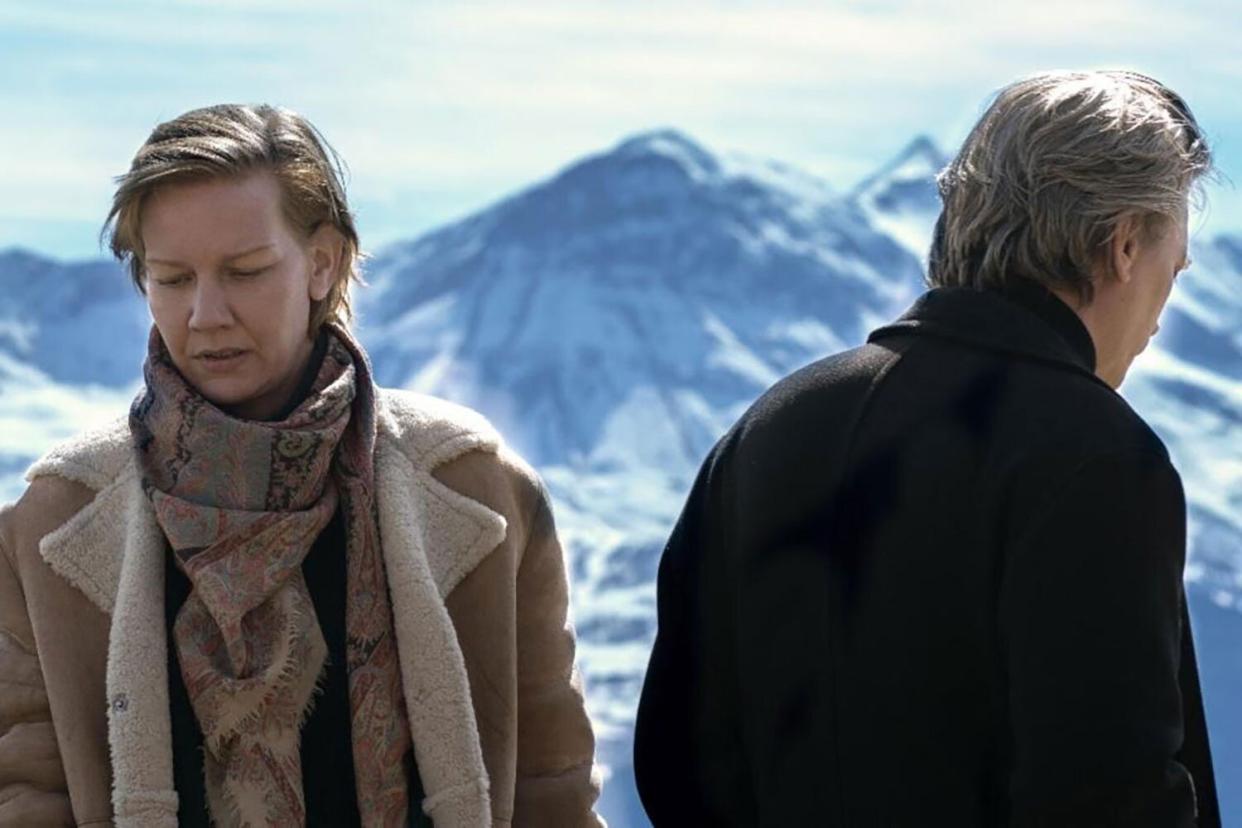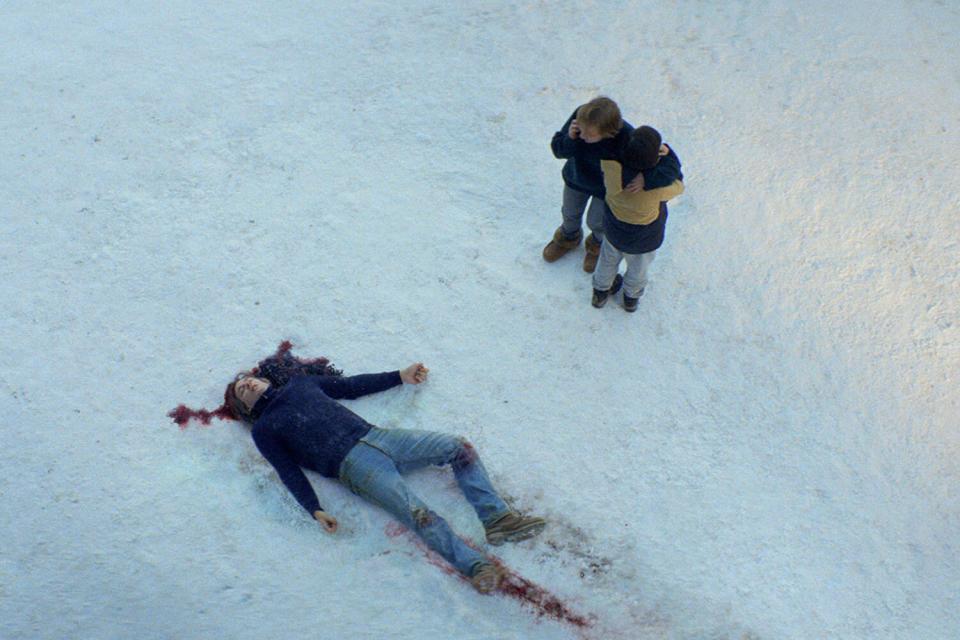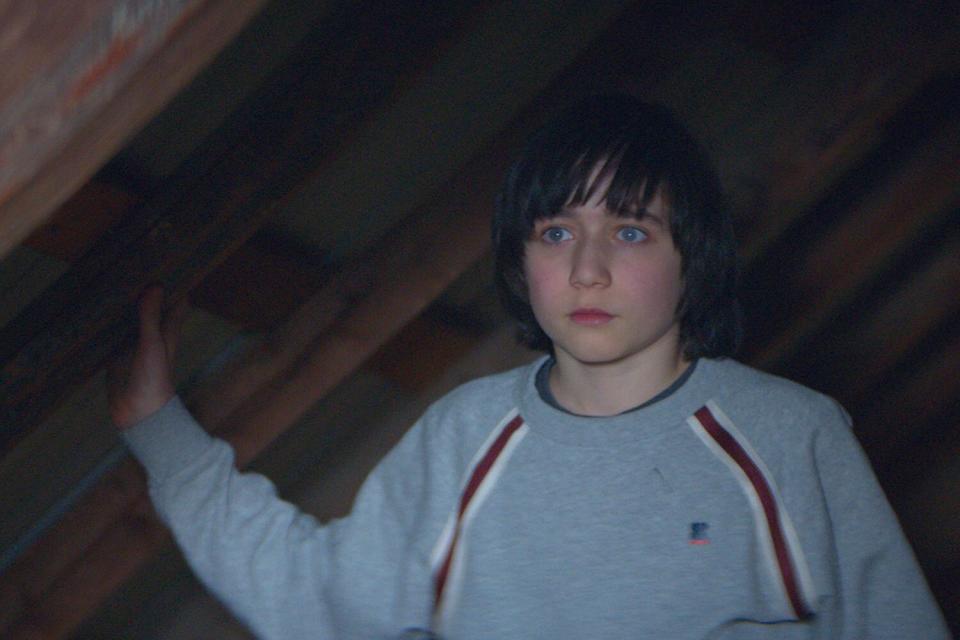Anatomy of a Fall review: The Palme d'Or winner is a courtroom drama that relishes ambiguity

- Oops!Something went wrong.Please try again later.
- Oops!Something went wrong.Please try again later.
Neon Sandra Hüller and Swann Arlaud in 'Anatomy of a Fall'
Anatomy of a Fall has already earned plenty of praise this film season, snagging the Palme d'Or, the top prize at the Cannes Film Festival, back in May.
Now, it's making its way stateside to ensnare audiences in its taut and twisty web. When Samuel Maleski (Samuel Theis) is found dead beneath his French chalet, his wife, Sandra (Sandra Hüller) emerges as the prime suspect in a murder case, despite her protestations that it was an accident or suicide. The only witness is their blind son, Daniel (Milo Machado Graner), who must make up his own mind as to whether his mother is guilty as she endures a harrowing murder trial.
Directed and co-written by Justine Triet, the drama explores the ambiguity of our lives, the strange line between reality and fiction, and the emotional toll of not fully knowing the truth. As the film takes us from Samuel's death to the investigation to the lengthy trial a full year later, it asks the audience to serve as judge and jury. Just as Daniel must decide what he believes, so, too, must we. As the film says, it's impossible to live with the uncertainty, so one must make up their own mind. Because Triet refuses to do it for us.

Neon Samuel Theis, Sandra Hüller, and Milo Machado Graner in 'Anatomy of a Fall'
With its Hitchcockian premise and our steady contemporary diet of shocking premium cable series and thrillers like Gone Girl, viewers will likely expect a twist ending, but Triet is more interested in letting audiences sit in the not knowing. It's a powerful, if somewhat frustrating choice, and feels utterly European in its satisfaction with no pat resolution. Her camera offers a similar ambiguity that tracks the emotional gauntlet of her characters with a detached eye. The way in which Triet shoots the trial, sometimes focusing on the prosecutor or defense team, other times on those who are simply observing, is a unique take on the genre. It places the audience in the courtroom, but it never encourages us to take a side.
Hüller is the film's anchor, a star of the festival season this year with Anatomy and The Zone of Interest. As Sandra Voyter, a successful writer, known for interpolating her own life into her work, she's enigmatic and empathetic all at once. There's a steeliness to her, enough that we can never quite entirely believe her vociferous insistence on her innocence. Her face is a riddle, even as she weathers difficult interrogations and breaks down at the prospect of her son's mistrust.

Neon Milo Machado Graner in 'Anatomy of a Fall'
She is matched by Graner as Daniel, a young actor who exudes both maturity and heartbreaking innocence in the same breath. He is the avatar for the audience, having to observe only that which is presented to him and make up his own mind. The added complication of his blindness elevates both his performance and the stakes of the drama.
Reality, ultimately, is only that which we perceive in our own lives. Whether we like it or not, a great deal of how we interpret the objective world around us is not only personal but also subjective. Anatomy of a Fall toys with that uncomfortable truth, using a Scenes of a Marriage-esque framing of snippets of Sandra and Samuel's relationship to trickle out the factors that might have contributed to his tragic death.
Triet also plays with gender roles, making the root of the strain in the central marriage one of equal labor but in reverse of what we might expect. Samuel feels he is saddled with too many homebound responsibilities, forced to sacrifice for Sandra's writing career. Additionally, Sandra is unapologetically sexual, seeking satisfaction outside her marriage when necessary. All of these traits would not necessarily be cause for suspicion if it were a husband and not a wife on trial. Triet lends Sandra these more traditionally masculine characteristics to complicate the film's interrogation of perception, bias, and guilt.
There's also a meta-emphasis on authorial voice and intent, as Sandra's novels get thrust into the trial. As she astutely points out, "A novel is not life and an author is not her characters." But films (and novels) are meant to reflect our lives back to us, to hold up a mirror and give us a way to engage with the more thorny issues of our existence via storytelling. Triet is both inviting us to do that with Anatomy of a Fall and warning against putting too much stock in the stories we read and tell ourselves (or is she?). Grade: B+
Anatomy of a Fall opens in select theaters on Oct. 17.
Want more movie news? Sign up for Entertainment Weekly's free newsletter to get the latest trailers, celebrity interviews, film reviews, and more.
Related content:

